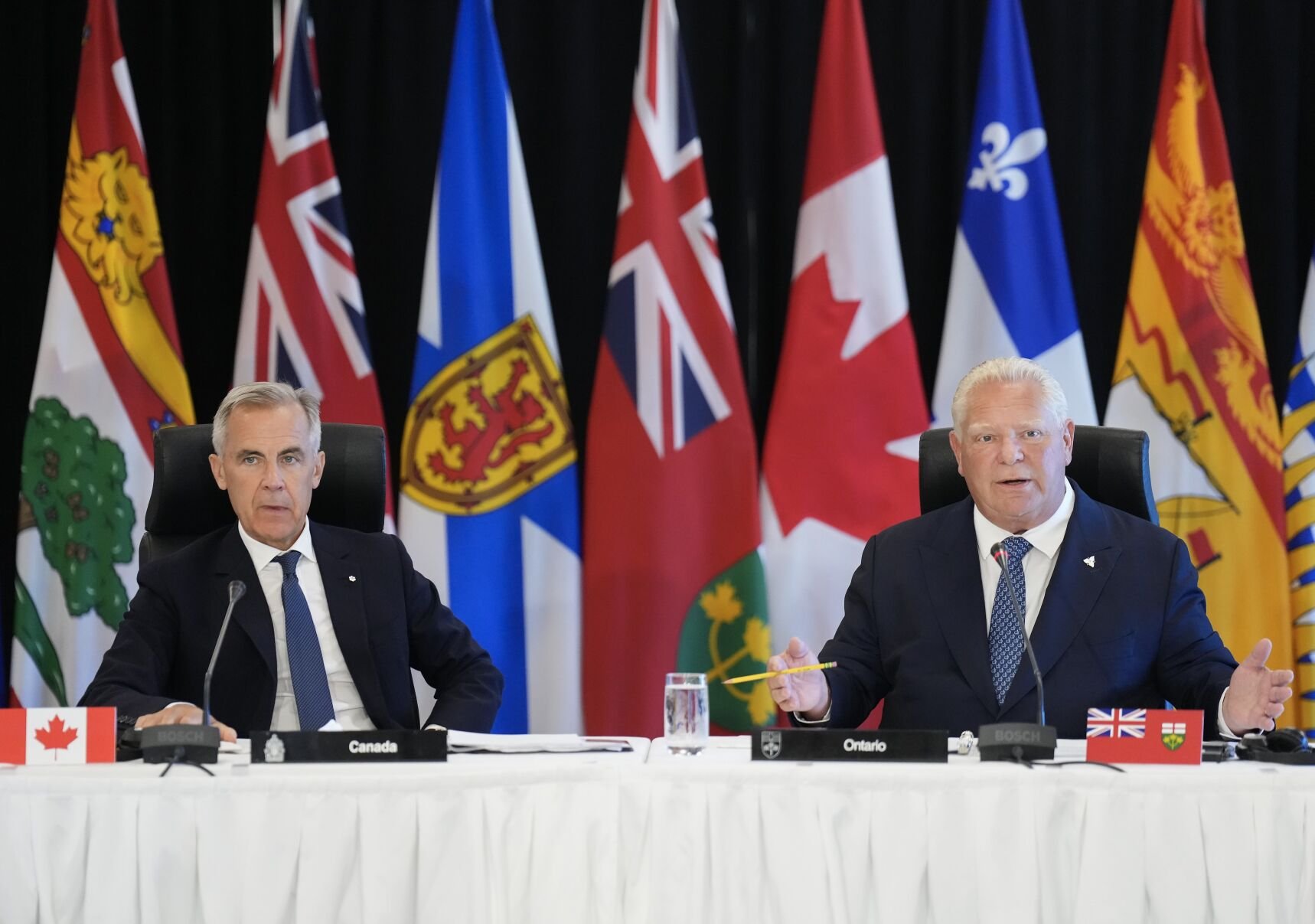Doug Ford says the quiet part out loud.
The loquacious Ontario premier has always been quotable, but rarely more so than when he’s railing against U.S. President Donald Trump’s trade attack on Canada.
Helpfully playing the bad cop to partner Mark Carney‘s good cop, Ford, as a subnational leader, can get away with saying things the prime minister cannot.
To wit, hours before Trump slapped a 35 per cent tariff on goods not covered in the Canada-U.S.-Mexico Agreement (CUSMA), the premier came out swinging.
“I told the prime minister, do not roll over. Hit that guy back as hard as we possibly can. And that’s what we need to do — and we can do it,” he told reporters Thursday morning in Thunder Bay.
“Prime Minister Carney is trying his best, but this guy (Trump) will say something one day, and he’ll wake up — and the cheese slips off the cracker — and then all of a sudden he goes the other way. And you’re thinking, ‘How do you deal with a guy like this?’”
Indeed.
Carney, who is in daily contact with Ford, values the premier’s counsel so much that he stayed at Ford’s Muskoka cottage last week on the eve of the first ministers’ meeting at Deerhurst Resort in Huntsville.
“We were up till 12:30 a.m. at night, chatting in front of the fireplace, solving all of the world’s problems,” a giddy Ford said the following afternoon.
For Canada’s economy, the biggest problem in the world right now is Trump.
Still, despite all of his “elbows up” rhetoric during this spring’s federal election campaign, Carney left the tough talk to Ford and struck a more measured tone early Friday.
“While the Canadian government is disappointed by this action, we remain committed to CUSMA, which is the world’s second-largest free trade agreement by trading volume,” the prime minister said in a statement.
“The U.S. application of CUSMA means that the U.S. average tariff rate on Canadian goods remains one of its lowest for all of its trading partners. Other sectors of our economy — including lumber, steel, aluminum, and automobiles — are, however, heavily impacted by U.S. duties and tariffs,” he noted without mentioning the massive trade pact is up for renegotiation next year.
“For such sectors, the Canadian government will act to protect Canadian jobs, invest in our industrial competitiveness, buy Canadian, and diversify our export markets.”
Although Ford backs that approach — acknowledging more than 90 per cent of what Canada sends stateside is covered under CUSMA and therefore won’t face the new tariff — he wants the Americans to at least fear a counterstrike.
“The federal government needs to hit back with a 50 per cent tariff on U.S. steel and aluminum. Canadian workers and businesses are desperate for certainty. Let’s work together, united, to deliver it,” the premier said on social media Thursday night.
There is ample evidence that Ford’s warnings — delivered online and in his many appearances on the U.S. cable news channels Trump watches — get noticed in Washington.
When he threatened to shut off the export of electricity Ontario sells to 1.5 million customers in New York, Michigan and Minnesota, Howard Lutnick, the excitable U.S. secretary of commerce, was immediately on the horn to complain.
After Ford outlawed the sale of U.S. alcohol in LCBO outlets — robbing Kentucky bourbon distillers of their largest single customer — Pete Hoekstra, the American ambassador to Canada, expressed his displeasure publicly and privately.
“They want to ban American alcohol. That’s fine. There are reasons why the president and some of his team referred to Canada as being mean and nasty to deal with … because of some of those steps,” Hoekstra said in undiplomatic remarks behind closed doors at a summit in Bellevue, Washington.
Four months after the premier reminded American consumers how much Canadian content was in their beloved pickup trucks, U.S. Treasury Secretary Scott Bessent conceded that point this week.
Asked about the Ford Motor Co. announcement that Trump’s tariffs cost the firm $800 million (U.S.) in the second quarter this year, Bessent noted the Ford F-150, America’s bestselling vehicle, is manufactured using Quebec aluminum.
“I think maybe the aluminum tariffs hit them harder. We will be negotiating with Canada on those,” he said on CNBC.
With tariffs on imported products now hovering at around 15 per cent, their highest rate since the Great Depression — and up from two per cent last year under former president Joe Biden — U.S. consumers will feel the pinch sooner rather than later.
That’s why the Ontario premier’s mantra is Trump’s tariffs are a tax that will make life more expensive for Americans.
So, as Canadian political and business leaders wait for prices to rise south of the border in hopes of making U.S. consumers more ornery about inflation, expect Ford to keep talking smack and Carney to keep quietly encouraging that.
Error! Sorry, there was an error processing your request.
There was a problem with the recaptcha. Please try again.
You may unsubscribe at any time. By signing up, you agree to our and . This site is protected by reCAPTCHA and the Google and apply.
Want more of the latest from us? Sign up for more at our newsletter page.




























To join the conversation set a first and last name in your user profile.
Sign in or register for free to join the Conversation